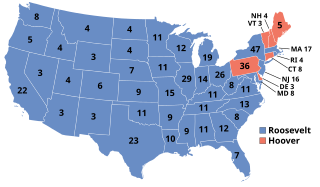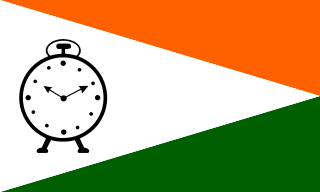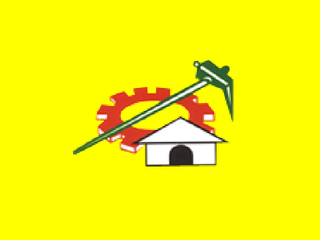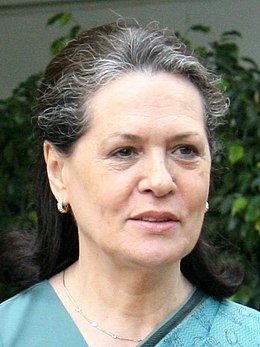The politics of India takes place within the framework of the country's constitution. India is a federal parliamentary democratic republic in which the President of India is the head of state and the Prime Minister of India is the head of government. India follows the dual polity system, i.e. a double government that consists of the central authority at the centre and states at the periphery. The constitution defines the organisational powers and limitations of both central and state governments, and it is well-recognised, rigid and considered supreme; i.e. the laws of the nation must conform to it.

The United States presidential election of 1932 was the thirty-seventh quadrennial presidential election, held on Tuesday, November 8, 1932. The election took place against the backdrop of the Great Depression. Incumbent Republican President Herbert Hoover was defeated in a landslide by Democrat Franklin D. Roosevelt, the Governor of New York. The election marked the effective end of the Fourth Party System, which had been dominated by Republicans.

The United States presidential election of 1936 was the thirty-eighth quadrennial presidential election, held on Tuesday, November 3, 1936. In the midst of the Great Depression, incumbent Democratic President Franklin D. Roosevelt defeated Republican Governor Alf Landon of Kansas. Roosevelt won the highest share of the popular and electoral vote since the largely uncontested 1820 election. The sweeping victory consolidated the New Deal Coalition in control of the Fifth Party System.

The United States Electoral College is a body of electors established by the United States Constitution, constituted every four years for the sole purpose of electing the president and vice president of the United States. The Electoral College consists of 538 electors, and an absolute majority of 270 electoral votes is required to win an election. Pursuant to Article II, Section 1, Clause 2, the legislature of each state determines the manner by which its electors are chosen. Each state's number of electors is equal to the combined total of the state's membership in the Senate and House of Representatives; currently there are 100 senators and 435 representatives. Additionally, the Twenty-third Amendment provides that the District of Columbia (D.C.) is entitled to a number of electors no greater than that of the least populous state.

The Bharatiya Janata Party is one of the two major political parties in India, along with the Indian National Congress. As of 2018, it is the country's largest political party in terms of representation in the national parliament and state assemblies, and it is the world's largest party in terms of primary membership. BJP is a right-wing party, and its policy has historically reflected Hindu nationalist positions. It has close ideological and organisational links to the Rashtriya Swayamsevak Sangh (RSS).

The Indian National Congress(pronunciation ) is a broadly based political party in India. Founded in 1885, it was the first modern nationalist movement to emerge in the British Empire in Asia and Africa. From the late 19th century, and especially after 1920, under the leadership of Mahatma Gandhi, Congress became the principal leader of the Indian independence movement. Congress led India to independence from Great Britain, and powerfully influenced other anti-colonial nationalist movements in the British Empire.

The 1945 United Kingdom general election was held on 5 July 1945, with polls in some constituencies delayed until 12 July and in Nelson and Colne until 19 July, because of local wakes weeks. The results were counted and declared on 26 July, to allow time to transport the votes of those serving overseas.

The Nationalist Congress Party (NCP) is a national level political party in India.

The Communist Party of India (CPI) is the oldest communist party in India. There are different views on exactly when it was founded. The date maintained as the foundation day by the CPI is 26 December 1925. The Communist Party of India (Marxist), which separated from the CPI in 1964 following an ideological rift between China and the Soviet Union, continues to claim having been founded in 1925.

Telugu Desam Party, abbreviated as TDP, is a regional political party active in the southern states of Andhra Pradesh and Telangana. The party was founded by N.T. Ramarao on 29 March 1982. Since 1995, the party is headed by N. Chandrababu Naidu, the incumbent Chief Minister of Andhra Pradesh. The party's headquarters is located at NTR Bhavan in Hyderabad.

Legislative elections were held in India in four phases between 20 April and 10 May 2004. Over 670 million people were eligible to vote, electing 543 members of the 14th Lok Sabha. The Lok Sabha, or "House of the People," is the directly elected lower house of the Parliament of India.

The All India Trinamool Congress is a national level political party in India. Founded on 1 January 1998, the party is led by its founder Mamata Banerjee, who is the current chief minister of West Bengal. Following the 2014 general election, it is currently the fourth largest party in the Lok Sabha with 36 seats.

Philippine elections are of several types. The president, vice-president, and the senators are elected for a six-year term, while the members of the House of Representatives, governors, vice-governors, members of the Sangguniang Panlalawigan, mayors, vice-mayors, members of the Sangguniang Panlungsod/members of the Sangguniang Bayan, barangay officials, and the members of the Sangguniang Kabataan are elected to serve for a three-year term.

India held general elections to the 15th Lok Sabha in five phases between 16 April 2009 and 13 May 2009. With an electorate of 714 million, it was the largest democratic election in the world till the Indian General Elections 2014 held from 7 April 2014.

The 2012 United States presidential election was the 57th quadrennial American presidential election, held on Tuesday, November 6, 2012. The Democratic nominee, President Barack Obama, and his running mate, Vice President Joe Biden, were elected to a second term. They defeated the Republican ticket of former Governor Mitt Romney of Massachusetts and Representative Paul Ryan of Wisconsin.

The 2016 United States presidential election was the 58th quadrennial American presidential election, held on Tuesday, November 8, 2016. The Republican ticket of businessman Donald Trump and Indiana Governor Mike Pence defeated the Democratic ticket of former Secretary of State Hillary Clinton and U.S. Senator from Virginia Tim Kaine, despite losing the popular vote. Trump took office as the 45th President, and Pence as the 48th Vice President, on January 20, 2017.

The 2017 United Kingdom general election took place on Thursday 8 June 2017, having been called just under two months earlier by Prime Minister Theresa May on 18 April 2017 after it was discussed in cabinet. Each of the 650 constituencies elected one Member of Parliament (MP) to the House of Commons. The governing Conservative Party remained the largest single party in the House of Commons but lost its majority, resulting in the formation of a minority government with a confidence-and-supply arrangement with the Democratic Unionist Party (DUP) of Northern Ireland.

The 2020 United States presidential election, scheduled for Tuesday, November 3, 2020, will be the 59th quadrennial U.S. presidential election. Voters will select presidential electors who in turn on December 14, 2020, will either elect a new president and vice president or re-elect the incumbents. The series of presidential primary elections and caucuses are likely to be held during the first six months of 2020. This nominating process is also an indirect election, where voters cast ballots selecting a slate of delegates to a political party's nominating convention, who then in turn elect their party's presidential nominee.






















